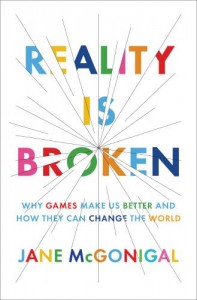A World Taken by Games: Jane McGonigal at TED
By Asher Crispe: January 28, 2011: Category Intellivisions, TED talks
There are people who exist to live in the box, then there are those who peek out of the box occasionally and even those who thrive by being out of the box all the time, resisting all attempts to be put back in. What may be needed for the future of education is to be so far out of the box that one ends up ‘blowing up’ the box entirely. Bye bye box.
So stow away your #2 pencils and chalkboard erasers. We’re dropping in on the high octane world of games. Watch Jane McGonical’s box shredding TED talk below, read the commentary that follows and then tell us what you think. Lock and load.

I am admittedly not a gamer. Even growing up, I tried to like games—everything from marbles and chess to Pacman and Donkey Kong—but it was to no avail. My hypothesis at the time was simply that I was a social mutant unadjusted to adolescent earth life and hopelessly uncoordinated. Years later, reflecting back, I think my lack of interest in gaming came from not understanding how they connected with the real world. More recently, as a parent watching my kids play and trying to attune myself to the new digital landscapes for today’s youth, I find myself having a change of heart. While still coming at it as an outsider, my appreciation for the immersive nature of games—particularly virtual worlds—and the intensity of focus that they command, has rapidly grown to the point where I find myself constantly advocating games as the wave of our educational future.
Looking around at people young and old, playing everything from Scrabble to Guitar Hero, from Tetris to World of Warcraft, I now share the conviction held by so many designers and researchers in the field of games, that the educational possibilities are endless. Working in Jewish education for many years, I can only imagine how much Talmud could be mastered by teenagers navigating its wisdom as presented in a massively multiplayer online game to bring but one example. Clearly, a well designed game can be redesigned to teach just about anything and there are already some wonderful examples of trial blazing organizations demonstrating just that.
Here is a small slice of what’s happening:
- Sparked: “The Microvolunteering Network has demonstrated that you don’t have to invest a lot of time to make a real world difference.” You can even fashion a nonprofit mission of your own. www.sparked.com
- Fold it! for science research. There are trillions of protein folding possibilities and you could help scientists figure out some of these puzzles with real world applications.http://fold.it/portal/
- E-line Media who create “game-based learning products and services” that speak to the educational needs of today and tomorrow. http://www.elinemedia.com/
- Games for Change is a stop for gamers wishing to bring about social change, playing for a better world. http://www.gamesforchange.org/
- Quest to learn, developed by the Institute for Play, is a game-based school for digital kids, complete with curricula and assignments you can download. http://q2l.org/
- World Without Oil has gamers work on virtual solutions to our energy problems with the understanding that one should “play it—before you live it.” http://www.worldwithoutoil.org/
 Of all of the qualities of gamers at play, the one that resonates the most with me is the overwhelming sense of autotelic involvement. As Jane McGonigal explains in her recent book Reality is Broken: Why Games Make Us Better and How They Can Change the World, this refers to the self-motivated and self-rewarding nature of gaming. Wouldn’t it be an amazing goal for all education to become so stimulating that when our students go home and have free time with nothing required of them—no homework or assignments of any kind—that they on their own would choose to continue learning. “Mom, Dad—please, please let me go learn! I just can’t get enough of this stuff.” We might call this the “loved it and I am begging for more” criteria for evaluation of educational success. We need to foster the uncontrollable excitement of games in and out of the class room.
Of all of the qualities of gamers at play, the one that resonates the most with me is the overwhelming sense of autotelic involvement. As Jane McGonigal explains in her recent book Reality is Broken: Why Games Make Us Better and How They Can Change the World, this refers to the self-motivated and self-rewarding nature of gaming. Wouldn’t it be an amazing goal for all education to become so stimulating that when our students go home and have free time with nothing required of them—no homework or assignments of any kind—that they on their own would choose to continue learning. “Mom, Dad—please, please let me go learn! I just can’t get enough of this stuff.” We might call this the “loved it and I am begging for more” criteria for evaluation of educational success. We need to foster the uncontrollable excitement of games in and out of the class room.
This same self-motivated spirit translates into a Jewish context in a number of profound ways. The Talmud makes a strange remark that in the future (i.e. in a redeemed reality) the commandments (of the Torah) will be nullified. This statement would appear to blow a hole through the conventional wisdom that the commandments (mitzvot) of the Torah are eternal and can neither be detracted from nor added to. The mystical dimensions of Judaism weigh in and help us untie the knot as follows:
When we think of the power structure and psychology of commandments, we picture the one doing the commanding as external to the one being commanded. The voice summons us from the outside. Coming from somewhere else, the ‘compulsion or sense of obligation,’ has an distinct foreignness to it. We don’t experience it as having originated within ourselves. On the contrary, we often feel like it was dropped on us from on high. In recognition of some key kernel of truth, we embrace the whole package while simultaneously acknowledging that there are some things beyond ourselves, realities bigger than us and which we cannot seem to fully grasp. Bottom line: we do the work because that was the assignment.
These same mystics anticipated that there would come a time when reality would start to mend the primordial tear that split the human psyche into inner and outer motivations. In this vein, the Chassidic manner of understanding insists we will come to deeply and directly comprehend the meaning and motivation of the commandments. When they are internalized and registered that way, we will stop thinking of them as commandments, because we will now sense that the voice that announces our call of duty is within.
When something becomes so much a part of ourselves, it just becomes second nature.
 The great Chassidic intellectual scholar, Rabbi Yitzchak Issak of Homil (1770-1857), liked to speak of the achievement of a natural consciousness. The performatives of the Torah would seem to lose their status as commandments and instead become like the air we breath. Our consciousness of them would ascend to the point of complete self-integration. They are the real me. No one needs to push me to do them. I neither require a rewards program nor the threat of punishment. So what the Talmud is telling us is of a time when we still carry out all of the same responsibilities and coordinate actions, yet the motivation is changed to the extent that the ‘command’ component no longer applies in the same way.
The great Chassidic intellectual scholar, Rabbi Yitzchak Issak of Homil (1770-1857), liked to speak of the achievement of a natural consciousness. The performatives of the Torah would seem to lose their status as commandments and instead become like the air we breath. Our consciousness of them would ascend to the point of complete self-integration. They are the real me. No one needs to push me to do them. I neither require a rewards program nor the threat of punishment. So what the Talmud is telling us is of a time when we still carry out all of the same responsibilities and coordinate actions, yet the motivation is changed to the extent that the ‘command’ component no longer applies in the same way.
The purity of motivation is a big theme in rabbinic discourse. To do something for its own sake is the objective. Working with an ulterior motive proves to be less attractive. In an educational context, this is the difference between learning because one loves to learn and suffering one’s task out of fear of punishing consequences or a misplaced obsession with secondary rewards. Take away the threat-benefit assessment—the calculus of outside pressures—and see if the student is still having at it. What self-motivated gaming screams out is that we need new rules for engagement. And we need them now.
A World Taken by Games: Jane McGonigal at TED,



















;)
;)
;)
;)
;)
;)
;)
;)
;)
;)

Amazing article and unbelievable site. Totally in tune with what is happening and what is needed. Looking forward to reading more from you. A refreshing and necessary perspetive…
Epic article, I very much enjoyed reading it. Thank you!